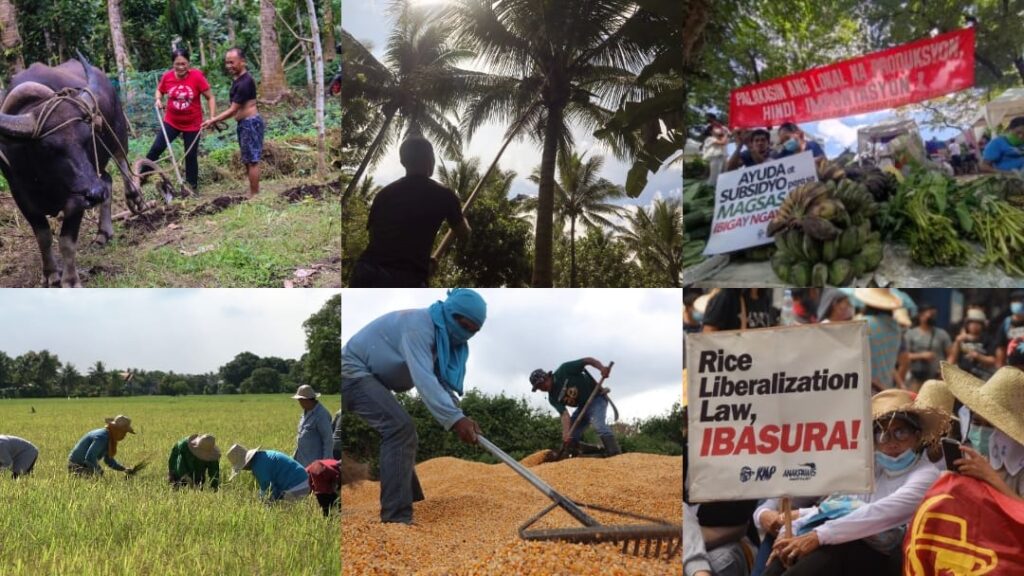
The Kilusang Magbubukid ng Pilipinas (KMP) strongly condemns the Marcos Jr. administration for enabling widespread land grabbing and forced displacement of farmers and rural communities through aggressive land-use conversion. The peasant group warned that the regime’s pro-business policies are intensifying the long-standing issues of landlessness and rural poverty in the country.
KMP Chairperson Danilo Ramos criticized the current land-use conversion policies for favoring big businesses and foreign corporations at the expense of Filipino farmers and indigenous communities.
“The ruling elite uses land-use conversion and reclassification as tools to displace farmers and Agrarian Reform Beneficiaries from their land. The government is facilitating large-scale land grabbing through policies that favor foreign and corporate interests,” Ramos said.
KMP cited the Enhanced Land Sector Development Framework (2019–2040) as a key instrument for facilitating land-use conversion. Under this framework, the government has streamlined the process for converting agricultural lands into industrial, commercial, and residential zones — often bypassing proper consultation with affected communities.
KMP Secretary-General Ronnie Manalo emphasized that affected farmers and rural communities are rarely consulted about these conversions.
“Farmers are always threatened with ejectment and eviction from their land. The push for infrastructure, real estate, ecozones, and tourism projects is causing massive livelihood losses for farmers. This is exactly what is happening in Central Luzon — the so-called ‘Rice Granary of the Philippines’, now being transformed into expressways, airports, malls, industrial parks, warehouses, subdivisions, recreation areas under the Central Luzon Development Plan or CLDP,” Manalo stated.
The transformation of Central Luzon was accelerated by the Duterte administration’s Build, Build, Build program (2017–2022), which Marcos Jr’s continued under the Build Better More program (2023–2028). This infra boom is leading to the displacement of farmers, fisherfolk, and indigenous people who rely on the land for their survival.
Manalo pointed to major infrastructure and industrial projects in Central Luzon as key drivers of land grabbing and displacement, including the Pampanga Megalopolis, Bulacan Aerotropolis, massive solar farms in Tarlac, the Freeport of Bataan Expansion, and various projects targeting Agrarian Reform Beneficiary (ARB) lands in Hacienda Luisita. He highlighted that Aboitiz Infracapital, Inc. is set to develop a 200-hectare economic estate in Tarlac City, with plans to convert an additional 500 hectares of Hacienda Luisita into a special economic zone under the guise of a “green energy” initiative.
In Sitio Balubad, Angeles City, 2,000 residents were forcibly evicted from a 73-hectare property in March 2024. Reports indicate that a combined team of police and hired security forces carried out violent demolitions that left scores injured. Meanwhile, in Barangay Taltal, Masinloc, Zambales, farmers and fisherfolk face eviction despite years of cultivating the land.
KMP also noted the ongoing struggle in Hacienda Tinang, where farmers fought for decades to reclaim land granted under the Comprehensive Agrarian Reform Program (CARP). Despite securing a legal victory, agrarian reform beneficiaries have yet to receive their land certificates and are now facing pressure to convert their lands into solar farms.
KMP is calling for the immediate suspension of all pending land-use conversion applications and a full review of existing conversion projects. Ramos underscored that Central Luzon farmers are prepared to engage in dialogue with the Department of Agrarian Reform (DAR) to address the widespread land-use conversion in the region. He stressed that affected farmers and communities deserve to be heard and involved in decisions affecting their lands and livelihoods.
“The fight for land and justice is a collective struggle,” Ramos asserted. “We call on all sectors — farmers, workers, youth, students, environmental advocates, legal professionals, and faith-based communities — to unite and resist displacement and land grabbing. Only through genuine land reform can we ensure food security and social justice,” the Makabayan senatorial candidate concluded.
##################
———————–The article provided is authorized for use, and represents solely the author’s personal opinions. Please contact us in the event of any potential infringement.



